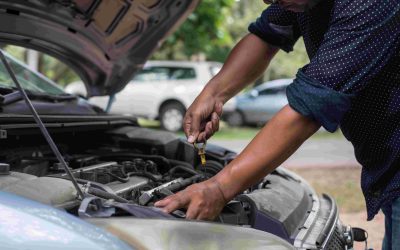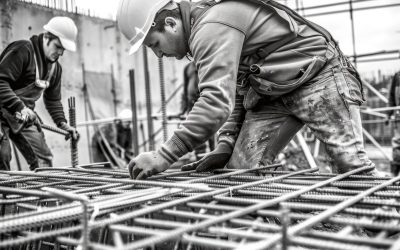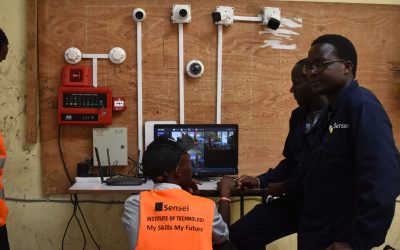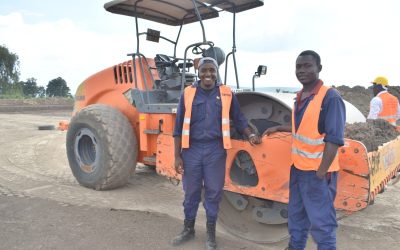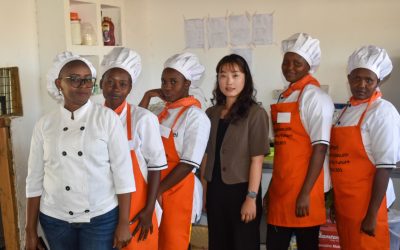Welding in Kenya: Everything You Need to Know
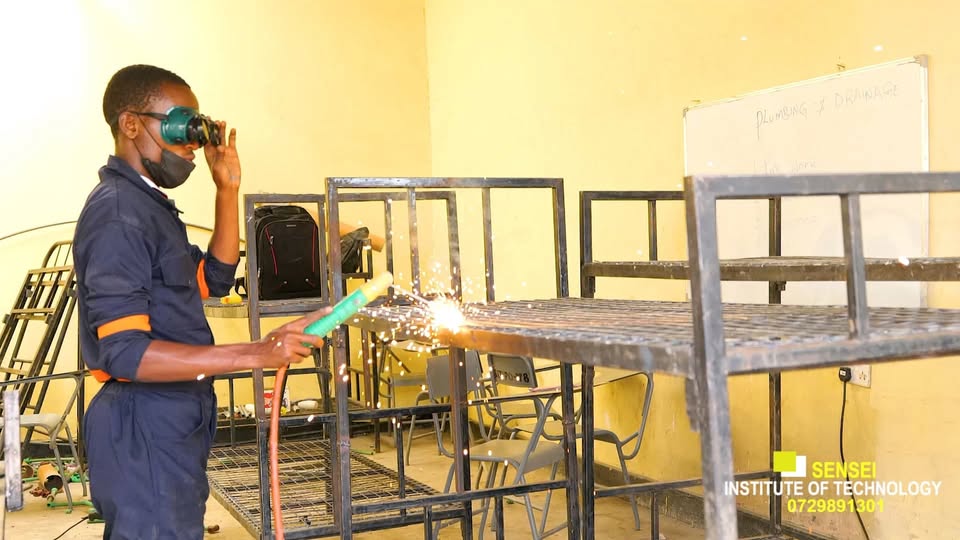
Welding is one of the most important technical skills in Kenya’s growing industrial, construction, and manufacturing sectors. From crafting gates and windows to building bridges, heavy machinery, and energy plants — welders play a vital role in national development.
This guide explores what welding is, the main welding types, the Kenyan job market, how to start a welding business, and where to train professionally — featuring Sensei Institute of Technology.
1. What Is Welding?
Welding is the process of joining two or more pieces of metal (or thermoplastics) by applying heat, pressure, or both, to fuse them together.
It’s a permanent method of bonding materials, and when done properly, the joint becomes as strong as the base metals themselves.
In Kenya, welding is widely used in:
- Construction of buildings, gates, tanks, and steel structures
- Vehicle body and machinery repair
- Industrial manufacturing and fabrication
- Agricultural and domestic equipment production
2. Why Welding Is Important in Kenya
Kenya’s economy is rapidly industrializing, and welding lies at the heart of this transformation. Here’s why the trade matters:
- Infrastructure Development: Mega projects like roads, bridges, and railway systems require extensive steelwork.
- Employment Creation: The welding and metal fabrication sector employs thousands of Kenyans in both formal and Jua Kali industries.
- Support for Local Manufacturing: Local welders reduce reliance on imports by producing and repairing essential products.
- Self-Employment Opportunities: With affordable equipment and training, anyone can start a small welding business.
According to the Kenya Institute for Public Policy Research and Analysis (KIPPRA), strengthening the welding and fabrication sector could significantly boost local job creation and industrial productivity.
3. Types of Welding Used in Kenya
Welding isn’t a one-size-fits-all process — different jobs require different techniques. The most common welding types in Kenya include:
1. Shielded Metal Arc Welding (SMAW) / Stick Welding
- The most popular method in Kenya.
- Uses a consumable electrode stick and electric current.
- Ideal for outdoor, construction, and repair work.
2. Gas Metal Arc Welding (GMAW / MIG Welding)
- Uses a continuous wire electrode and shielding gas.
- Produces clean, strong welds — ideal for lighter materials.
3. Gas Tungsten Arc Welding (GTAW / TIG Welding)
- Highly precise; perfect for stainless steel and aluminum.
- Used in industrial fabrication and high-quality finishing.
4. Oxy-Acetylene Welding (Gas Welding)
- Combines oxygen and acetylene gas to produce a high-temperature flame.
- Common for cutting, repair, and smaller fabrication tasks.
5. Resistance Welding
- Used in industrial manufacturing — especially automotive and sheet-metal production.
4. The Welding Industry in Kenya: Market Overview
The welding industry in Kenya is expanding rapidly, driven by the government’s focus on industrialisation and infrastructure.
Key insights:
- The market for welding equipment and services is growing in tandem with the construction boom.
- Private contractors, manufacturing companies, and SMEs rely heavily on skilled welders.
- Kenya’s informal Jua Kali sector dominates small-scale welding, fabricating gates, tanks, furniture, and household metalwork.
- However, there’s a skills gap — many welders learn through apprenticeships without formal training or certification, leading to inconsistent quality.
This is where institutions like Sensei Institute of Technology step in to professionalize the trade.
5. Welding Training in Kenya — Learn at Sensei Institute of Technology
If you’re serious about becoming a professional welder or metal fabricator in Kenya, the best place to train is the Sensei Institute of Technology (SIT). Sensei is Kenya’s leading technical college for hands-on, industry-aligned training in welding and fabrication.
About the Course
The Welding and Fabrication Course at Sensei Institute of Technology provides students with practical, real-world skills in metal joining, design, and production.
It blends classroom theory with intensive workshop experience — preparing learners for work in construction sites, factories, and independent workshops.
Core Topics Covered:
- Arc, MIG, and TIG welding processes
- Metal cutting, shaping, and bending techniques
- Blueprint interpretation and layout
- Welding safety and PPE use
- Fabrication of gates, tanks, and steel structures
- Equipment maintenance and inspection
🏫 Why Choose Sensei Institute of Technology?
- 100% Practical Training – You spend most of your time in the workshop learning by doing.
- Modern Equipment – Training uses updated welding machines and industry-standard tools.
- Accredited & Certified – Sensei is a registered TVET institution approved by NITA and relevant Kenyan authorities.
- Affordable Fees – Welding courses cost around Ksh 25,000 per month with flexible options for short and full-time study.
- Career Linkages – Sensei connects graduates with job opportunities and helps them start their own businesses.
- High Employability – Sensei graduates are preferred by contractors and manufacturers due to their proven competence.
Campuses
Sensei Institute of Technology offers welding courses at:
- Nakuru Campus
- Kitengela Campus
Both have fully equipped workshops and expert trainers committed to producing skilled, job-ready welders.
Certification
Upon completion, students receive a Certificate in Welding and Fabrication. This qualification allows graduates to work anywhere in Kenya or even internationally as certified welders.
📞 Learn more or apply:
👉 Sensei Institute of Technology – Welding Course
6. Career Opportunities for Welders in Kenya
Welding opens doors to multiple career paths, such as:
- Construction and infrastructure welding
- Automotive body repair
- Metal furniture and grill fabrication
- Pipeline and industrial plant welding
- Machine repair and maintenance
- Self-employment through personal workshops
Earnings:
Experienced welders in Kenya can earn between Ksh 30,000 and Ksh 120,000, depending on specialization and project scale. Skilled welders who own workshops often make even more.
7. Starting a Welding Business in Kenya
Starting a welding business is an excellent way to become self-employed. Here’s how:
- Get Training: Acquire certified welding skills from Sensei Institute.
- Write a Business Plan: Identify your target market and services (gates, tanks, structural work).
- Buy Equipment: A starter kit (welding machine, grinder, gas, PPE) costs about KSh 150,000.
- Find a Good Location: Set up shop in a high-traffic area or near construction sites.
- Market Your Services: Use word of mouth, social media, and showcase your projects.
- Prioritize Quality: Maintain safety, durability, and professional standards to build a solid reputation.
8. Challenges Facing Welders in Kenya
Despite the opportunities, the sector faces key challenges:
- Lack of access to modern welding equipment
- Inconsistent training standards among informal artisans
- Safety and PPE negligence
- Competition from cheap imported metal products
- Unstable electricity supply in rural areas
Institutions like Sensei Institute are bridging this gap by upskilling Kenyan welders with modern training and safety awareness.
9. The Future of Welding in Kenya
The future of welding in Kenya is bright, with trends like:
- Increased automation and CNC metal cutting
- Use of advanced alloys and lightweight materials
- Expansion of renewable energy projects (solar and wind infrastructure)
- Growth of the automotive and ship repair industries
- More emphasis on certified, safety-compliant welders
As Kenya continues its industrial transformation under Vision 2030, professional welding skills will remain in high demand.
10. Final Thoughts
Welding is more than a trade — it’s a pathway to financial independence, technical innovation, and national growth.
If you’re passionate about building, designing, or working with metal, now is the time to join a professional welding course and acquire the skills the job market needs.
The Sensei Institute of Technology provides the best training environment in Kenya — blending affordability, practical experience, and real-world opportunities.
Start Your Welding Journey Today
Enroll at Sensei Institute of Technology and turn your technical passion into a profession that builds Kenya’s future.

